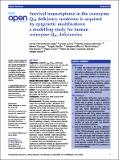Por favor, use este identificador para citar o enlazar a este item:
http://hdl.handle.net/10261/129137COMPARTIR / EXPORTAR:
 SHARE SHARE
 CORE
BASE CORE
BASE
|
|
| Visualizar otros formatos: MARC | Dublin Core | RDF | ORE | MODS | METS | DIDL | DATACITE | |

| Título: | Survival transcriptome in the coenzyme Q10 deficiency syndrome is acquired by epigenetic modifications: a modelling study for human coenzyme Q10 deficiencies |
Autor: | Fernández-Ayala, Daniel J. M.; Guerra, Ignacio CSIC; Jiménez-Gancedo, Sandra CSIC; Cascajo Almenara, M. V. CSIC ORCID; Gavilán, Angela; DiMauro, Salvatore; Hirano, Michio; Briones, Paz CSIC; Artuch, Rafael; Cabo, Rafael de; Salviati, Leonardo; Navas, Plácido CSIC ORCID | Palabras clave: | Basic sciences Genetics |
Fecha de publicación: | 2013 | Editor: | BMJ Publishing Group | Citación: | BMJ Open 3(3): e002524 (2013) | Resumen: | [Objectives]: Coenzyme Q10 (CoQ10) deficiency syndrome is a rare condition that causes mitochondrial dysfunction and includes a variety of clinical presentations as encephalomyopathy, ataxia and renal failure. First, we sought to set up what all have in common, and then investigate why CoQ10 supplementation reverses the bioenergetics alterations in cultured cells but not all the cellular phenotypes. [Design Modelling study]: This work models the transcriptome of human CoQ10 deficiency syndrome in primary fibroblast from patients and study the genetic response to CoQ10 treatment in these cells. [Setting]: Four hospitals and medical centres from Spain, Italy and the USA, and two research laboratories from Spain and the USA. [Participants]: Primary cells were collected from patients in the above centres. [Measurements]: We characterised by microarray analysis the expression profile of fibroblasts from seven CoQ10-deficient patients (three had primary deficiency and four had a secondary form) and aged-matched controls, before and after CoQ10 supplementation. Results were validated by Q-RT-PCR. The profile of DNA (CpG) methylation was evaluated for a subset of gene with displayed altered expression. [Results]: CoQ10-deficient fibroblasts (independently from the aetiology) showed a common transcriptomic profile that promotes cell survival by activating cell cycle and growth, cell stress responses and inhibiting cell death and immune responses. Energy production was supported mainly by glycolysis while CoQ10 supplementation restored oxidative phosphorylation. Expression of genes involved in cell death pathways was partially restored by treatment, while genes involved in differentiation, cell cycle and growth were not affected. Stably demethylated genes were unaffected by treatment whereas we observed restored gene expression in either non-methylated genes or those with an unchanged methylation pattern. | Descripción: | This is an open-access article distributed under the terms of the Creative Commons Attribution Non-commercial License. | Versión del editor: | http://dx.doi.org/10.1136/bmjopen-2012-002524 | URI: | http://hdl.handle.net/10261/129137 | DOI: | 10.1136/bmjopen-2012-002524 | ISSN: | 2044-6055 |
| Aparece en las colecciones: | (CABD) Artículos |
Ficheros en este ítem:
| Fichero | Descripción | Tamaño | Formato | |
|---|---|---|---|---|
| Survival transcriptome.pdf | 347,48 kB | Adobe PDF |  Visualizar/Abrir |
CORE Recommender
PubMed Central
Citations
10
checked on 01-abr-2024
SCOPUSTM
Citations
21
checked on 23-abr-2024
WEB OF SCIENCETM
Citations
18
checked on 23-feb-2024
Page view(s)
275
checked on 24-abr-2024
Download(s)
246
checked on 24-abr-2024

